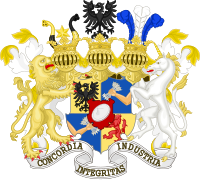
Photo from wikipedia
Our purpose in this editorial is to draw attention to the powerful but undertheorized role played by traditions in family businesses. Our core argument is that traditions are the foundational… Click to show full abstract
Our purpose in this editorial is to draw attention to the powerful but undertheorized role played by traditions in family businesses. Our core argument is that traditions are the foundational element of successful family businesses. As we elaborate here, we believe that family business success and longevity are directly correlated with the capacity to successfully manage the creation, maintenance, and intergenerational transmission of traditions. Because of their unique nature, family business tensions are often intergenerational in character and, thus, rest on the family business’s capacity to integrate past, present, and future. We examine two key family business tensions in this editorial. The first is the tension between the need to maintain the business or innovate. De Massis et al. (2016) refer to this tension as the “innovation paradox,” but for reasons that will become obvious later, we refer to it as the Theseus paradox, a classic thought experiment from ancient Greek philosophy premised on the mythological hero best known for killing the Minotaur. The second is the tension between the need to honor the founder’s vision of the firm or adapt to the vision of the children. While this tension is commonly labelled as an issue of succession, we view the tension as broader and deeper than mere succession and term this tension the Oedipus paradox, a reference to another character of Greek myth who, in his efforts to save his city, unwittingly kills his father. While the two paradoxes derive from broader tensions of continuity versus change, they differ in that the first is premised on theories of path dependence and the second is premised on theories of imprinting. Traditions are the primary mechanism by which these tensions are navigated in family businesses. While research has acknowledged traditions as a distinguishing characteristic of family businesses (Lumpkin et al., 2008), the construct of traditions is only weakly theorized. In the absence of a strong theoretical frame, however, the empirical evidence of the role played by traditions in navigating these essential tensions of the family business remains unclear. We initiate the process of theorizing traditions in this editorial. We begin by describing how the hybrid structure of traditions as both structure (what gets transmitted across generations) and agency (the process of transmission) creates the opportunity to view traditions both as essentialist constructs that endure through time and as subjective constructs that are constantly being reinterpreted in an ever moving present. We then introduce the literature on rhetorical history that provides a framework explaining how the process of reinterpreting the past to manage the present actually occurs. Finally, we use this emergent theoretical framework to explain how traditions are used to resolve the Theseus paradox and the Oedipus paradox in family businesses.
Journal Title: Family Business Review
Year Published: 2020
Link to full text (if available)
Share on Social Media: Sign Up to like & get
recommendations!